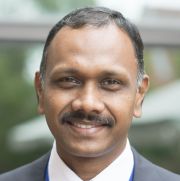The following blog has been co-authored by the CareForward Team of Senthil Rajasekaran, Lauren Mazzurco, Christine Matson, Don Robison, Anca Dobrian, Marta Ambrozewicz, Raja Koteeswaran, Mekbib Gemeda, Cindy Cadieux, Carrie Elzie, Arun Mohanram and April Pace
It seems like American Healthcare has been in “crisis mode” since 1900s. Despite so many advances, little has changed in controlling cost and improving value and health outcomes. Even though there is plenty of evidence to suggest that clinical care at its best contributes to only 20% of patient health outcomes and a whopping 80% is determined by socioeconomic and behavioral factors, little is done in medical education to address the 80%. Recently we are witnessing a welcome trend, where undergraduate (UME) and graduate medical education (GME) are seen as part of this solution. At Eastern Virginia Medical School (EVMS) we have implemented our new CareForward curriculum to teach cost, value, and health system sciences in the UME. Realizing the challenges in effectively integrating these complex topics in UME, our team at EVMS has created a set of virtual families, members of which will be represented in the clinical cases that are used in the UME curriculum. These virtual families represent diverse patient populations (e.g., age, gender, sexual orientation, ethnicity, race, culture, belief system, literacy level, socioeconomic status and geography), and introduce variables such as veteran affairs, family dynamics, financial turbulence, health equity/disparity, roles within a care delivery team, access to community resources, interactions of organizations and complexities of care in specific patient populations. Each organ system module and clerkship will use longitudinal clinical cases that are drawn from the virtual families.
The virtual families are woven together by stories that bring clinical scenarios to life and highlight patient- and family-centered, cost-conscious care for the unique needs of the elderly and those with multi-morbidity/multiple chronic conditions (MCC), as well as a host of social determinants of health.
For example, instead of a conventional approach to discussing a case of osteoarthritis in an 86-year-old female, in our model the same is discussed in the context of 86-year-old Ms. Christine Pascual, who has unique personal needs and family circumstances. As part of a comprehensive management plan, interprofessional teams that include architects are discussed along with non-steroidal anti-inflammatory drugs as an option to manage pain. Another case with the same person is introduced four months later in the Gastroenterology (GI) and Metabolism module when Ms. Pascual presents with upper GI issues to discuss drug induced gastritis/peptic ulcer. The students are tasked to suggest alternative and cost-effective approaches to manage the disease in this case.
For this innovative model, EVMS has received the AMA Accelerating Change in Education Grant and is honored to be part of the consortium. In addition, the model was also chosen as the winner in the ABIM Foundation and Costs of Care Teaching Value Challenge. Our team also continues to receive requests from other medical schools to share the model.
The Harvard Macy (HM) course on Leading Innovations in Education and the session by Dr. Christensen, where he describes the various types of innovation teams and the modular approach to innovation, continues to be an excellent model upon which the new curriculum process has been developed. Innovations like these require out of the box thinking and creation of autonomous teams that are given the freedom to think and suggest new ways to teach these complex topics. The HM session that emphasizes the importance of process and various types of teams, i.e. functional team light and heavy weight teams and autonomous team gave us the insights into how teams function and importance of team structure in every project.
Senthil Kumar Rajasekaran, MD


